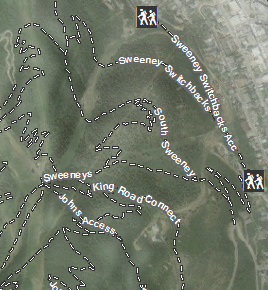Trails

Trails and Trailheads
- Category: Recreation
- Data Type: GIS Data Layer
- Steward(s): AGRC
- Web Application: View
- Abstract: Many Utah trails and trail access points have been obtained through the efforts of The Utah Office of Tourism and GOED from Orbital View, Inc. The acquired data is crowd-sourced and curated and is currently far from comprehensive, but it does contain over 20,000 miles of trails and 550 trail access points. AGRC has taken this trail data and integrated trails from the U.S. Forest Service and other entities, we have included many Community features associated with Community Parks and neighborhoods that provide opportunities for Active Transportation.
The trails dataset currently contains trail names, types, and some information on allowable modes of travel. Although it is very much ‘draft’ in nature, this dataset represents a starting point to integrate additional trail systems from other local, state, and federal agencies. The success of this effort will rely heavily on local government and land stewards to review and continue to improve upon this data.
Trails and Pathways

The Utah Trails and Pathways map layer represents off-street (features not represented in the road centerline layer) features and important road connections that augment Utah’s recreational trail and transportation network. This map layer features many of Utah’s trails and pathways but is not yet complete.
Currently, the content primary depicts features used by hikers/pedestrians and bikers. It began with map data purchased from a private entity (Orbital View, Inc), for which full rights were purchased by the GOED Office of Outdoor Recreation in July 2014. Since the original purchase, subsequent substantive updates have included: 2014 Revisions from National Park service; 2015 additions from Emery County; June 2016 additions from Cache County US Forest Service Geodata Hub (all forests except Sawtooth in NW Box Elder County), and Mountainland Association of Governments (Utah and Wasatch counties); 2018/2019 additions as part of the multimodal project; and currently ongoing updates by WFRC transportation planners.
Presently, the planned approach for on street bicycle lanes and routes is to incorporate them in the the statewide roads GIS layer using left and right side attributes. On street bike infrastructure is not expected to be represented in this map layer.
Although it is a work in progress, this dataset represents a substantial starting point to integrate additional trail systems from other local, state, and federal agencies. The success of this effort will rely heavily on local government and land stewards to review and continue to improve upon this data. Additional segments can be submitted to Utah AGRC for inclusion in this dataset.
Note: Significant enhancements (including a schema change) were made to this layer in June 2020. Read more about the changes in this related blog post.
- CartoCode
- For a more specific query of facility types, use the CartoCode field:
- 1 - Hiking Only (Hiking and walking are the only uses allowed on this facility)
- 2 - Hiking and Biking (Singletrack, natural surface facility. Hiking and biking are allowed)
- 3 - Paved Shared Use (Paved shared use path, recreational path, urban pathway)
- 4 - Road-concurrent (Facility is on or adjacent to a road, generally a natural surface double track, forest service road, canal road, etc.)
- 5 - Biking Only- (Biking is the primary or only use on this facility. High speeds, blind corners and technical features are common. For safety reasons, hiking, if not expressly prohibited, is not recommended.)
- 6 - Equestrian Primary (Equestrian is the primary use on this facility)
- 7 - Steps (Steps, staircase, or other feature that is not accessible to wheeled or assistive devices on otherwise paved / accessible route)
- 8 - Bridge, Tunnel (Grade change above or below ground surface, generally a bridge or tunnel)
- 9 - Link (Network route connection, see Link on CVDomain_TrailClass tab)
- Class
- For a general query of facility types, use the Class field:
- Path - Paved, off-street travelway designed for non-motorized users, generally wider and with greater separation from roadway than a standard sidewalk
- Trail - Natural surface travelway (dirt, gravel, slickrock, snow, etc)
- Link - Network route connection through a parking lot, alleyway, etc. where a road segment does not exist but can be traversed via walking or bicycling
- Steps - Developed (generally concrete) steps or stairs, usually occurring along a paved route
- Grade Separated Crossing - Paved crossing feature above or below roadway, train track, etc. for walking and bicycling use only
- Complete Data Model
- Trails and Pathways Data Model
- Previous Data Model (deprecated June 2020)
Comments, questions, compliments, or concerns can be directed to the staff from AGRC at agrc@utah.gov or 801-538-3665.
Downloads and Web Services
Updates
- October 09, 2020
Trailheads

Trailheads are point locations that provide access, and often vehicle parking, for recreational trail users. This map layer features many of Utah’s trailheads but is not yet complete. In the future, it is expected to include trailhead data assembled from a variety of sources including: US Forest Service, US National Parks Service, State Parks, and map data for which full rights were purchased by the GOED Outdoor Recreation Office in July 2014, from a private entity (Orbital View, Inc).
Currently (April 2017), this layer includes only the original data purchased from Orbital View. Additional trailheads can be submitted to Utah AGRC for inclusion in this map layer.
The primary goal for the trailheads map layer is to assign a location and a name to each trailhead. However, the trailhead data is stored within a more complex data model that will allow for collection and publishing of more robuts trail and trailhead information in the future.
Related Resources
Comments, questions, compliments, or concerns can be directed to the staff from AGRC at agrc@utah.gov or 801-538-3665.
Downloads and Web Services
Updates
- This feature class was originally obtained in July 2014 and will be updated periodically.